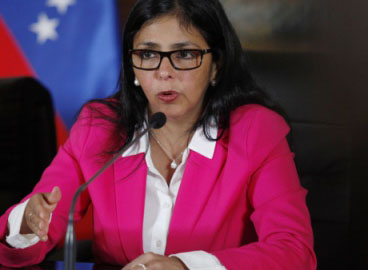LUXEMBOURG, (Reuters) – The European Union imposed economic sanctions on 11 senior Venezuelan officials yesterday in protest at President Nicolas Maduro’s re-election, which the bloc says was not free or fair, and over his government’s alleged rights abuses.
The new travel bans and asset freezes, discussed and reported by Reuters in May, follow EU moves against seven other senior officials in January. They do not target Maduro directly, as the EU seeks to pressure those around him first.
Those blacklisted include Venezuela’s industry minister and former vice president Tareck El Aissami, already sanctioned by the United States for drug trafficking.
The European Union said he was “responsible for serious human rights violations … including arbitrary detention, politically motivated investigations, inhumane and degrading treatment, and torture”. The 28-nation bloc also targeted Delcy Rodriguez, who became vice president when Maduro reshuffled his cabinet after his widely-condemned re-election in May. Rodriguez was formerly president of the pro-government constituent assembly, which critics say Maduro set up last year to override an opposition-controlled national assembly. She has also been foreign minister.
The bloc said she had undermined Venezuelan democracy. Others targeted include ministers and the Venezuelan Deputy Attorney General Katherine Harrington, a Maduro loyalist also blacklisted by the United States.
Maduro’s government denounced the new sanctions, which it said infringed international law by violating Venezuela´s sovereignty, and accused the EU of “flagrant subordination” to the administration of U.S. President Donald Trump.
“The European Union is attacking the political peace in Venezuela by involving itself in internal issues,” it said in a statement.
The EU, Venezuela’s third-largest trading partner after the United States and China, is seeking to isolate Caracas and to help remove what it sees as an authoritarian regime. It imposed an arms embargo in November. Venezuela’s mainstream opposition boycotted the election because two of its most popular leaders were barred, authorities banned several parties, and the election board was run by Maduro loyalists. Critics say Maduro is resorting to increasingly authoritarian tactics as the economy spirals deeper into recession. There are dire shortages of food, medicine and other essentials.
Maduro accuses the United States of waging “economic war” on Venezuela and trying to delegitimise his democratic victory.
In its latest round of sanctions, the United States penalised four Venezuelans and three Florida-based companies in May, on top of measures already in place restricting business with Venezuela’s all-important oil industry.
The European Union has yet to target businesses, seeking to spare any impact on the local population.






